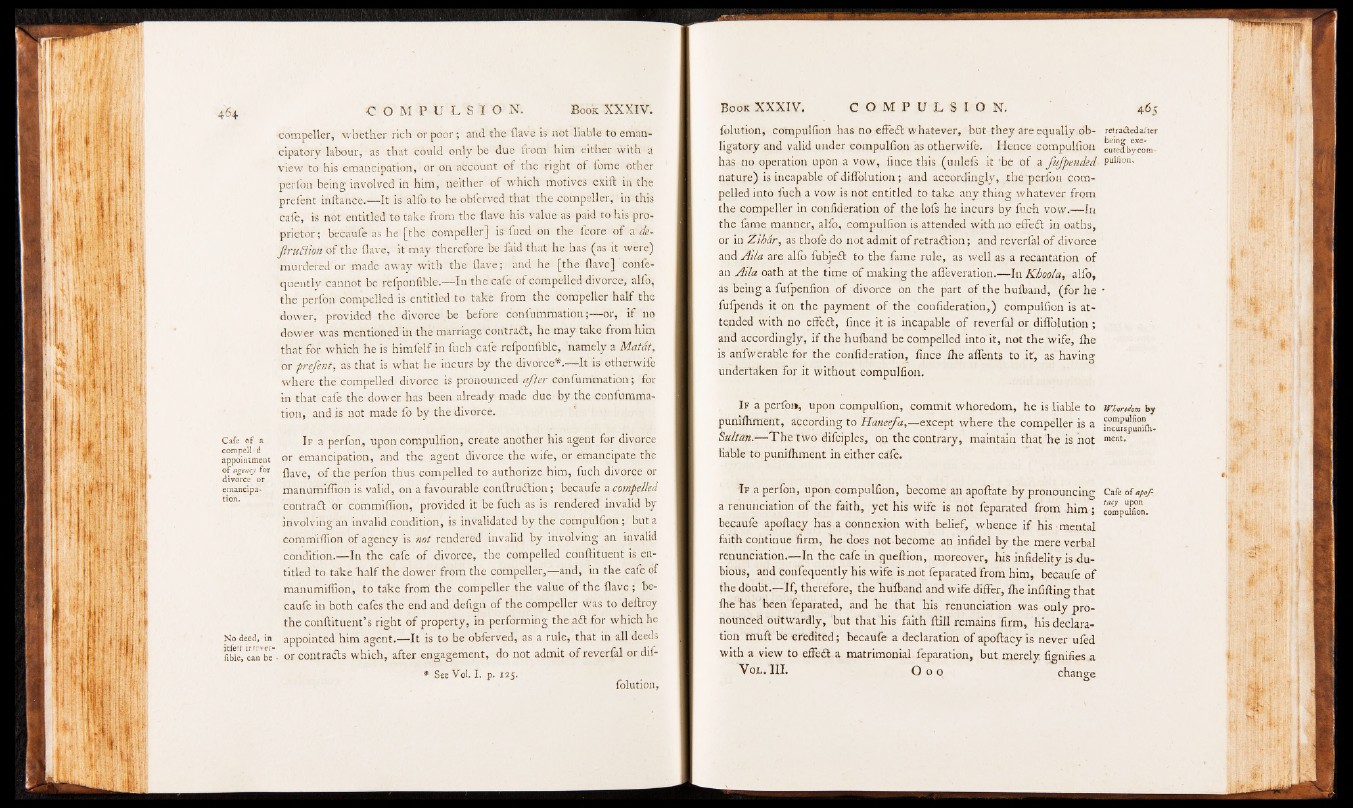
compeller, whether rich or poor ; and the (lave is not liable to emancipatory
labour, as that could only be due from him either with a
view to his emancipation, or on account of the right of fome other
perfon being involved in him, neither of which motives exift in the
prefelit inftance.— It is alfo to be obferved that the compeller, in this
cafe, is not entitled to take from the Have his value as paid to his proprietor;
becaufe as he [the compeller] islued on the fcore of a à -
JlruBion of the Have, it may therefore be faid that he has (as it were)
murdered or made away with the {lave; and he [the Have] confe-
quently cannot be refponfible.— In the cafe of compelled divorce, alfo,
the perfon compelled is entitled to take from the compeller half the
dower, provided the divorce be before confummation ;— or, i f no
dower was mentioned in the marriage contract, he may take from him
that for which he is himfelf in fuch cafe refponfible, namely a Matât,
or prefent, as that is what he incurs by the divorce*.— It is otherwife
where the compelled divorce is pronounced after confummation ; for
in that cafe the dower has been already made due by the confummation,
and is not made fo by the divorce.
Cafe o f a I f a perfon, upon compulsion, create another his agent for divorce
appmntment or emancipation, and the agent divorce, the wife, or emancipate the
of a g u cj for f l a v e 0f the perfon thus compelled to authorize him, fuch divorce or
émancipa- rnanumiffion is valid, oil a favourable conitru£hon ; becaufe a compelled
contrail or commiffion, provided it be fuch as is rendered invalid by
involving an invalid condition, is invalidated by the compulfion; buta
commiffion of agency is not rendered invalid by involving an invalid
condition.— In the cafe of divorce, the compelled conftituent is entitled
to take 'half the dower from the compeller,— and, in the cafe of
manumiffion, to take from the compeller the value of the (lave ; becaufe
in both cafes the end and defign of the compeller was to deftroy
the conftituent’ s right of property, in performing the aft for which he
No deed, in appointed him agent.— It is to be obferved, as a rule, that in all deeds
Able, can be - or contracts which, after engagement, do not admit of reverfal or dif-
* See V o l. I . p. 125.
folutiotr
465
folution, compulfion has no effedl whatever, but they are equally .ob- retraaedafter
ligatory and valid under compulfion as otherwife. Hence compulfion cutedbveom-
has no operation upon a vow, fince this (unlefs it 'be o f a fufpended- Pullion-
nature) is incapable of diffolution; and accordingly, the ~perfou compelled
into fuch a vow is not entitled to take any thing whatever from
the compeller in confideration o f the lofs he incurs by fuch vow.— In
the fame manner, alfo, compulfion is attended with no effedt in oaths,
or in Zihar, as thofe do not admit of retradlion; and reverfal of divorce
and Alia are alfo fubjedt to the fame rule, as well as a recantation of
an Aila oath at the time of making the afleveration.— In Khoola, alfo,
as being a fufpenfion of divorce on the part of the hufband, (for he •
fufpends it on the payment of the confideration,) compulfion is attended
with no effedl, fince it is incapable o f reverfal or diflolution ;
and accordingly, if the hufband be compelled into it, not the wife, ffie
is anfwcrable for the confideration, fince ffie aflents to if, as haying
undertaken for it without compulfion.
If a perfo», upon compulfion, commit whoredom, he is liahle to w bm dm by
puniffiment, according to Hanetfa,—except where the compeller is a
Sultan.— T h e two difciples, on the contrary, maintain that he is not ment>
liable to puniffiment in either cafe.
"If a perfon, upon-compulfion, become an apoftate.by pronouncing Cafeofapof-
a renunciation of the faith, yet his wife is not feparated from him; compulfion.
becaufe apoftacy has a connexion with belief, whence i f his-mental
faith continue firm, he does not-become an infidel by the mere verbal
renunciation.— In the cafe in queftion, moreover, his infidelity is dubious,
and confequently his wife is not feparated from him, becaufe of
the doubt.— If, therefore, the huffiand and wife differ, ffie infiftin-o- that
fhe has been feparated, and he that his renunciation was only pronounced
outwardly, 'but that his faith ftill remains firm, his declaration
muft be credited; becaufe a declaration of apoftacy is never ufed
with a view to effedl a matrimonial feparation, but merely fignifies a
V o L .l i l . O o o change